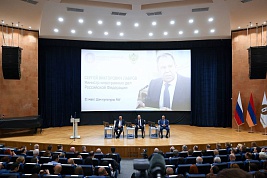Permanent Delegate of the Russian Federation to UNESCO Alexander Kuznetsov’s remarks at the plenary meeting of the 201st session of the UNESCO Executive Board, Paris, April 25, 2017
Mr Chairperson, colleagues,
Today, as international terrorism threatens our common cultural heritage, youth radicalisation takes on threatening dimensions, and modern information technology is used to spread hatred and enmity, UNESCO's mandate to “build peace in the minds of men and women” is more relevant than ever before. In its recently adopted historic Resolution 2347, the UN Security Council welcomed the central role of UNESCO in protecting cultural heritage from terrorists for a good reason.
Clearly, the situation with the criminal destruction of the cultural heritage of Syria calls for urgent measures on the part of UNESCO. The action plan for the implementation of the Strategy for the Reinforcement of UNESCO's Action for the Protection of Culture and the Promotion of Cultural Pluralism in the Event of Armed Conflict submitted to the current session of the Executive Board, provides a good basis for building up work in this area. Our number one goal is to save Palmyra, the crown jewel of human civilisation, which was captured and destroyed by terrorists and liberated again. The first thing to do here is to demine the area, without which it is impossible to properly assess the damage and to begin the reconstruction process. Russian mine pickers are already working in Palmyra. Creating an international demining coalition in Syria would help to speed up this work. We call upon all our UNESCO partners who are interested in preserving historical heritage to get involved in addressing this critical problem.
The world needs a strong, efficient and effective UNESCO capable of meeting current challenges and providing an appropriate response. In this regard, high expectations are associated with the election of a new Director General, hopefully, a worthy successor to Ms Bokova. However, the future of UNESCO depends to a large extent on us, the member states, and our determination to support the organisation at this difficult juncture.
The first thing that can and should be done by the member states is to help the organisation overcome the protracted financial crisis. We consider refusal by any member to pay their fees or attempts to impose political conditions on them as a violation of the Charter of the organisation and its Financial Regulations. It is unacceptable to tighten the financial noose around UNESCO's neck and at the same time ask it to be more efficient.
The second thing that needs to be done is to agree on strategic priorities with regard to the activities of UNESCO. We should focus on areas where UNESCO is indispensable or has more experience and expertise than other international institutions.
The third and final thing is that we should give up any temptation to use UNESCO’s platform to address fleeting political concerns. We fully share the thought expressed in this regard by the Delegate of India. The attempts to consider issues of territorial belonging or to square historical accounts are an absolutely dead-end track and a disastrous path to take for our organisation. The politicisation destroys it from within. Eliminating hot-button issues, which clearly have no solution here, from the agenda will save us both time and effort, and also allow us to focus on what our countries and peoples expect from UNESCO.
Thank you.
